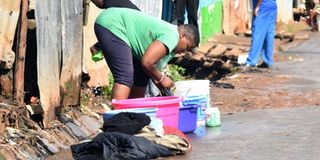New report shows how women working in informal sectors were affected during Covid pandemic

A woman washing clothes in Nairobi's Kibra slums.
Women living and working in informal areas were disproportionately affected by restrictions imposed during the pandemic, according to a new report.
The report, produced by the International Centre for Research on Women (ICRW), highlights the sudden change in lifestyle that women had to cope with during the pandemic.
Researchers analysed various aspects, including pre-pandemic household workload, access to support mechanisms, access to credit, impact on employment, policies on gender-based violence and sexual and reproductive health, and coping strategies, among others.
ICRW's Africa Director, Evelyne Opondo, said in a statement that the design and implementation of COVID-19's economic recovery and social protection policies did not directly target informal sector workers.
"While NGOs played a critical role in implementing social assistance programmes, such as cash transfers targeted at women in informal settlements and vulnerable households, the lack of a single comprehensive registry made it difficult for the government to account for the reach of these interventions," she said.
Even before the pandemic, the study shows that most informal sector workers (IWWs) were responsible for childcare and some household tasks.
"The closure of educational institutions led to a high childcare burden, meaning that IWWs had to divide their time between business and domestic activities. The particularly high childcare burden during the COVID-19 lockdown further entrenched socio-cultural norms and reduced IWWs' access to paid employment," the findings show.
When public health measures were introduced in the country, the immediate impact on informal women was the loss of their daily income. Because of the nature of their work, they did not have the advantage of securing loans and having extra money to cushion them from the pains of the pandemic. The report shows that almost seven out of ten women had their income drastically reduced compared to the pre-Covid period, as they had to look after themselves as well as other people who needed their help."Because they were unable to take advantage of the protection schemes set up by the government in the wake of the pandemic. Many IWWs resorted to cutting spending, depleting savings and selling property in order to survive," the report said.It found that more than half of Kenyans were aware of food aid but had not received any.Speaking to journalists yesterday, Chryspin Afifu, a gender expert working with ICRW, explained that this is because the government has a single registry to issue our interventions.
"On the other hand, workers in the informal sector are not beneficiaries by law. In Uganda they are, but not in Kenya. Another reason is the uncoordinated efforts between and among those offering different forms of assistance. The elephant in the room was corruption, nepotism and such systemic challenges that distort targeting," he said.
He added that some of these coping strategies were unsustainable and only exacerbated women's vulnerability even after the fire of the pandemic had died down.
Most reports have already reiterated the extent of the damage caused by sexual and gender-based violence during the pandemic, but this new report sheds more light on what went wrong.
It says the media played an important role in disseminating such information, but fewer women in informal areas had access to some of the main media sources, such as radio and television.
"The restrictions on movement that limited access to these and other social services increased the vulnerability of women in the informal sector prior to COVID.The stay-home policy response to COVID-19 and the economic hardship due to business closures and loss of jobs and income led to higher incidences of GBV, which in turn increased women's vulnerability as a result of the COVID-19 policy response," the report said.
For those women who were willing to go to the rescue centres, the main limitation was the restrictions placed on them.Afifu explained that they used sources such as a toll-free number 1195, the National Crime Research Centre, the Centre for Rights Education Awareness (CREAW) helpline and the Coalition on Violence against Women (COVAW) hotline to determine the extent of damage during the pandemic.
The report also showed that if the women or their relatives fell ill, almost seven in ten would have to pay hospital bills out of their own pockets because they had no form of insurance.The study also found that more than half of the women do not have bank accounts, preferring to keep their money in mobile accounts, and three in 10 women keep their money in women's collectives such as chamas and table banking."This is an important moment to look at the multi-faceted impact of COVID-19 on women in formal and informal work in Uganda and Kenya - and around the world. We should learn from this experience to develop more inclusive, gender-responsive policies to support workers who are often overlooked and undervalued," said Peggy Clark, Chief Executive and President of ICRW.





